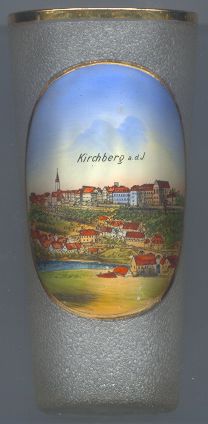

|
| DEUTSCHLAND | GERMANY |
| Bundesland: Baden-Württemberg | |
| Regierungsbezirk: Stuttgart | |
| Landkreis: Schwäbisch Hall |
 Kirchberg an der Jagst is situated at an elevation of 384 m on a ridge overlooking the valley of the
river Jagst in northeastern Baden-Württemberg.
Kirchberg an der Jagst is situated at an elevation of 384 m on a ridge overlooking the valley of the
river Jagst in northeastern Baden-Württemberg.
The lords of Kirchberg, who had founded a castle at this strategic location for the purpose of protecting a ford across the river, were first mention in 1265. The town Kirchberg was founded by Counts of Hohenlohe in 1373 next to the castle which in 1313 had come into their possession. Kirchberg received a town charter in 1373. In 1384 the town was pawned to the Imperial cities Hall, Rothenburg and Dinkelsbühl; in 1398 it was sold altogether. During this period Kirchberg was fortified. The town wall and the tower ("Stadtturm"; 45 m high) are still preserved today. The castle was destroyed in 1525 during the Peasants' War. In 1562 the counts of Hohenlohe residing in Weikersheim repurchased Kirchberg and after 1590 built a new Renaissance castle at the site of the former castle. The new castle was remodeled in Baroque style in 1738/1756. From 1690 until 1861 Kirchberg was the residence of the Counts (1764 Princes) of Hohenlohe-Kirchberg (a partition of Hohenlohe-Langenburg). In 1804 the small principality covered an area of just 11 villages. Two years later the principality lost its sovereignty and was incorporated into the Kingdom of Bavaria before it was traded in 1810 to Württemberg. The dynasty Hohenlohe-Kirchberg became extinct in 1861 and after that Kirchberg was reduced to a small rural town. However, at the same time Kirchberg slowly began to attract tourists who discovered the area for their summer vacations. The neighbouring communities of Gaggstadt, Hornberg and Lendsiedel were incorporated into the municipality in 1972/1975 and in 1975 Kirchberg was officially recognized as a resort town. Today, Kirchberg an der Jagst has a population of about 4,450 (2004).
Further glasses in this collection show views from
Kirchberg (Saxony, Germany),
Kirchberg am Wagram (Lower Austria) and
Kirchberg am Wechsel (Lower Austria).
Glasses from other places named Kirchberg in this collection are:
Kirchberg am Wagram and
Kirchberg am Wechsel, both in Lower Austria.
|
![[scale]](lineal.jpg)